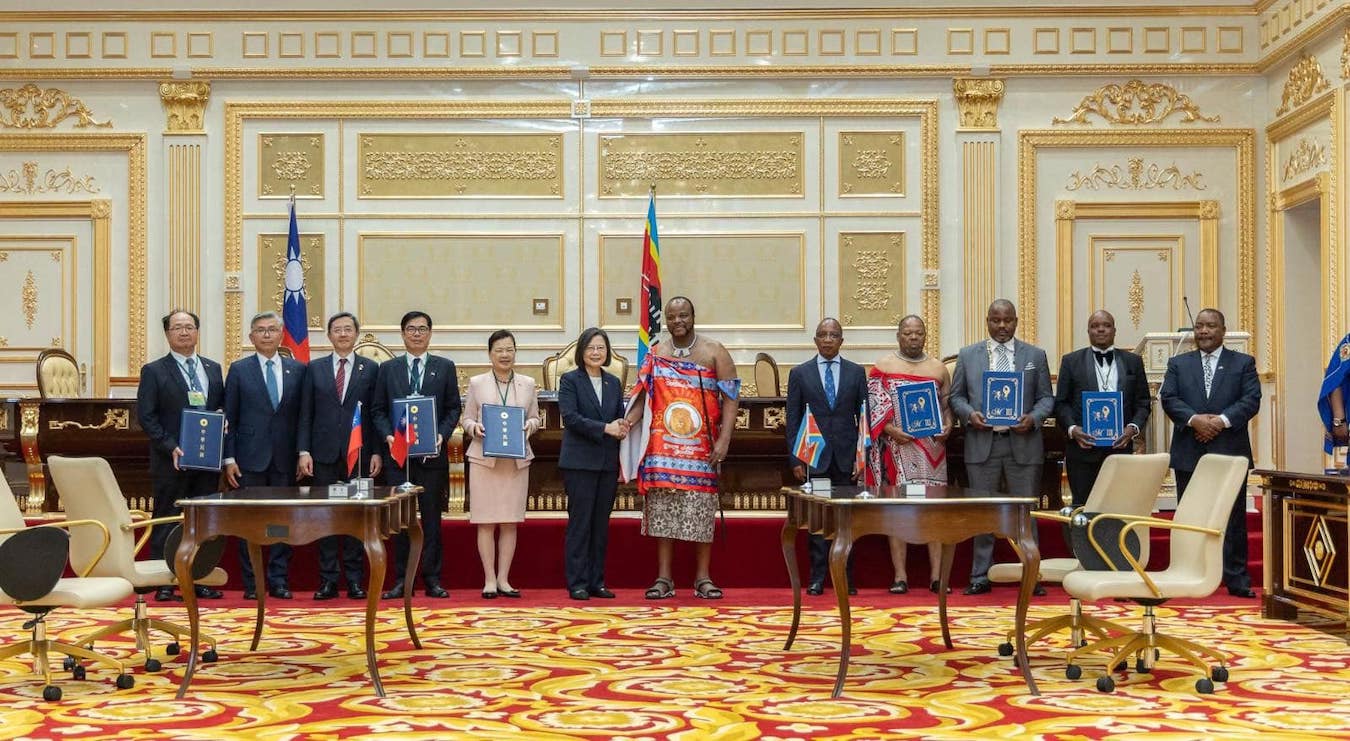by Brian Hioe
語言:
English
Photo Credit: Brian Hioe
New Bloom editor Brian Hioe interviewed Tanele Maseko, human rights defender from Swaziland and the wife of Thulani Maseko. Thulani Maseko, an opposition politician and human rights lawyer, was killed by unidentified gunman in January of this year. As this took place after comments by Swazi monarch King Mswati III suggesting that critics of his should be killed, it is thought that this killing was ordered by the monarch. Tanele Maseko was visiting Taipei for the Oslo Freedom Forum on October 18th.
Despite the questionable human rights record of Swaziland, which was renamed Eswatini by Mswati III in April 2018, it is one of Taiwan’s diplomatic allies. Taiwanese president Tsai Ing-wen most recently visited Eswatini this September.
Brian Hioe: Could you first introduce yourself for those that do not know you?
Tanele Maseko: My name is Tanele Maseko. I’m a human rights defender from Swaziland. And I am married to the late Thulani Rudolph Maseko, human rights lawyer and human rights activist from Swaziland. I am now CEO of the newly founded Thulani Maseko Foundation.
BH: Would you say you are trying to carry on your husband’s work after his unfortunate assassination?
TM: Yes, that is very true. I continue to push for his legacy, his ideals, what he stood for, what he fought for, and eventually what he died for.
BH: And so that would be regarding the democracy movement in Swaziland? That there is not democracy, that it’s an absolute monarchy, that the parliamentary system is dissolved, and the constitution is signed, and so forth.
TM: That is quite true, Brian. I am driving the narrative that Swaziland needs to open up the space for democracy. Swaziland is ruled by an absolute monarch. Swaziland does not have political parties. The current government doesn’t believe in political parties or political participation.
So yes, I am trying to tell people of the world that Swaziland is governed by the last absolute monarch who is a brutal monarch, an evil system that we need the people of the world to assist us–as Swaziland–to gain and attain our democracy. And not to embrace this dictator as they are doing–and as Taiwan is doing, in helping to fund a dictatorship.
 Taiwanese president (center-left) meeting Swaziland monarch King Mswati III (center-right) in September. Photo credit: Tsai Ing-wen/Facebook
Taiwanese president (center-left) meeting Swaziland monarch King Mswati III (center-right) in September. Photo credit: Tsai Ing-wen/Facebook
BH: As you know, Taiwan itself is a country that went through an authoritarian past but in this case is backing the authoritarian regime. The protests in Swaziland remind me of the protests that needed to take place for Taiwan to have a democracy. So, in that sense, what would you want the people of Taiwan to know about the situation in Swaziland?
TM: I want the people of Taiwan to know that Swaziland is in a dire situation. Swaziland is a ticking time bomb. We have a lot of our colleagues and comrades who are living in exile.
That is but one issue. Political participation is not allowed. Political parties are banned. Human rights defenders are labeled terrorists. Political activists are labeled terrorists. But what is also critical when it comes to Swaziland is our education system is collapsing. Our health system is in a crisis.
So I would ask the people of Taiwan to stand with the people of Swaziland in pushing the Taiwanese president, in asking the Taiwanese government to stop aiding a dictator who gets benefits from Taiwan. Such benefits do not help the ordinary Swazi on the street.
I would urge the people of Taiwan to encourage and put pressure on the king to discuss the future and democracy of Swaziland openly, freely, and honestly. Taiwan complains of China. How then can you complain of China and yet you continue to support a dictatorship like Swaziland?
BH: For example, after the protests in past years, the Taiwanese government contributed money to the reconstruction and there was little public discussion of what happened in Eswatini. Could you comment on that?
TM: The unemployment rate is so low. People aren’t employed. The youth in Swaziland are educated. But in terms of job opportunities, there is nothing. Because the economy is concentrated on the royal family, its cohorts, and its supporters.
People are not getting jobs as they deserve. Teachers are actually leaving Swaziland, coming to Taiwan. Nurses are leaving Swaziland, going to Ukraine, because they feel they deserve better pay.
The way that the economy is run in Swaziland, the economy is getting worse. People are not benefiting, and yet the government is supposed to be creating jobs, and bringing in investors. But how do investors come into a country where human rights are violated?
The environment in Swaziland is not conducive to business because the king and his government continue to close down the space for political parties to exist. We do not even have elections. We have selections. You go there and you pay your allegiance to the king, his heirs, and successors–and not the interest of the people of Swaziland. You do not represent the honest Swazi on the street when you go into parliament. It is just about you getting your salary, and not caring about creating policy that will assist in improving the lives of Swazis.
BH: The monarchy itself skims off a lot of money from companies.
TM: You are correct, Brian. The monarchy has shares in most of the companies in Swaziland. And the fact that his majesty the King is doing business in Swaziland, then it leaves us with no option because then if the king is in business, the king in Swaziland, you can’t take him, he’s above the law, you can’t take him to court.
Even if you have an aggrievance as an employee, you cannot take the company that belongs to the King to court. The King and his mother are above the law in Swaziland. You cannot sue him.
You cannot take him to court because even the courts back home are not independent. The Chief Justice is chosen by the King. The Chief Justice is a headsman of the King. The judges are appointed by the King.
BH: What would you like to see Taiwan do in this case? For example, today, Wuerkaixi urged that I suppose that human rights be part of the conditions for aid to Swaziland.
TM: I would urge the Taiwanese government to be honest. If they claim to be democratic, if they claim to value human rights, they need to talk to their closest ally and put pressure on him that if he doesn’t stop violating human rights, they will stop with their aid.
If they put that condition, you can say: Your Majesty, you do not open up the space for political participation, if you continue to put people into prison and you continue to torture people, we will not support you because those aren’t the values of a democracy.
We need to have an honest, open dialogue on a free Swaziland, on a new constitution for Swaziland with the King. We need a dialogue that the people will have, will contribute in, where the people will have a say on the economy, and have a say on the runnings of the country. We need to recognize political parties. We need to unban political parties.
So we need the Taiwanese president to be honest and talk to her allies. She cannot support a dictator, and yet she too is complaining of dictatorship by China.
What is the government of Taiwan benefiting from Swaziland? Recognition and diplomacy at the expense of the Swazi. So I feel the Taiwan government needs to come out clearly to say, why are they supporting His Majesty the King? What are they benefiting? And does that benefit the man on the street? It doesn’t.
BH: It’s deeply ironic that you have all these visits that have occurred recently, where Tsai visits Swaziland and claims Taiwan stands together with Swaziland as fellow democracies, and yet this is happening.
TM: Yes. It is quite shocking and very upsetting that political leaders continue to be dishonest. I mean, here you have the president of Taiwan having close ties with Swaziland. She travels to Swaziland, a place where human rights violations are dire, a place where in 2021, there are massacres committed by the security forces, by the army.
She doesn’t say anything about that. She owes us that explanation, or at least to assist us to attain our democracy.
 Tanele Maseko speaking at the Oslo Freedom Forum in Taipei on October 18th. Photo credit: Brian Hioe
Tanele Maseko speaking at the Oslo Freedom Forum in Taipei on October 18th. Photo credit: Brian Hioe
BH: Absolutely. Have there been responses from the Taiwanese government that you’ve heard? For example, you just shared a stage with the Vice Minister of Foreign Affairs.
TM: We met with the Speaker of Parliament. We met with different members of the Legislative. We also met with your Deputy Minister of Foreign Affairs. I cannot, unfortunately, divulge what went into those meetings. Those were closed meetings.
BH: We’ve talked quite a bit about the government of the state of Taiwan and its backing of the Swaziland state. But what do you think that the people of Taiwan should do if they want to stand in support of the democracy in Swaziland?
TM: The people of Taiwan should talk to their government for them to account as to why they continue to support a dictator. And the people of Taiwan need to stand with the Swaziland people to support us in seeking democracy. They must stand in solidarity with us in calling out their president to say, Madam President, if you believe in the value of human rights, let us support the Swaziland people, and let us not support this dictator.
BH: Is there anything you’d like to say in closing?
TM: In closing, I’d honestly want to say Taiwan is a beautiful place where people are warm.
But Taiwan people need to support the Swaziland people for us to be like them, for us to flourish.
We can do this only when we are honest with each other and if we stand in solidarity with each other. I plead with the Taiwanese people to push their government to put pressure on His Majesty the King, to stop killing innocent civilians, to stop killing political activists, to stop arresting and torturing human rights defenders, and to seek dialogue on behalf of the people of Swaziland. And I think if they can do that, we can be happy as the people of Swaziland.
BH: Thank you.

